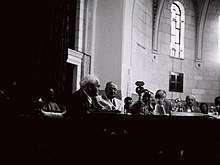

The United Nations Special Committee on Palestine (UNSCOP) was created on 15 May 1947[1][2] in response to a United Kingdom government request that the General Assembly "make recommendations under article 10 of the Charter, concerning the future government of Palestine". The British government had also recommended the establishment of a special committee to prepare a report for the General Assembly. The General Assembly adopted the recommendation to set up the UNSCOP to investigate the cause of the conflict in Palestine, and, if possible, devise a solution. UNSCOP was made up of representatives of 11 countries. UNSCOP visited Palestine and gathered testimony from Zionist organisations in Palestine[3] and in the US. The Arab Higher Committee boycotted the commission, explaining that the Palestinian Arabs' natural rights were self-evident and could not continue to be subject to investigation, but rather deserved to be recognized on the basis of the principles of the United Nations Charter.[4]
The report of the committee dated 3 September 1947[5] supported the termination of the British Mandate in Palestine. It contained a majority proposal for a Plan of Partition into two independent states with Economic Union (CHAPTER VI) and a minority proposal for a Plan for one Federal Union with Jerusalem as its capital (CHAPTER VII). The majority plan was supported by 7 of the 11 members, with Iran, India and Yugoslavia voting against it, and Australia abstaining. The Zionist side accepted the Plan of Partition while the Arab side rejected both proposals.
Following the report's release, the Ad Hoc Committee on the Palestinian Question was appointed by the General Assembly.
On 29 November 1947, the General Assembly adopted Resolution 181, based on the UNSCOP majority plan (with only slight modifications to the proposed recommendations).[6]
- ^ A/RES/106 (S-1) Archived 2012-08-06 at the Wayback Machine of 15 May 1947 General Assembly Resolution 106 Constituting the UNSCOP
- ^ Report of the First Committee Archived 2014-12-24 at the Wayback Machine, 13 May 1947. Preparing meeting (doc.nr. A/307)
- ^ UN Doc A/364/Add.2 PV.33 Archived 2015-09-10 at the Wayback Machine of 16 July 1947 UNSCOP report, Verbatim record (Waad Hair, Federation of Jewish Labour, Jewish Agency for Palestine)
- ^ UN Doc A/364 Add. 1 d.d. 3 September 1947 Archived 3 June 2014 at the Wayback Machine See ANNEX 8 Letter dated 10 July 1947 from the Arab Higher Committee confirming its decision concerning collaboration with the Special Committee
- ^ UNITED NATIONS: General Assembly: A/364: 3 September 1947: OFFICIAL RECORDS OF THE SECOND SESSION OF THE GENERAL ASSEMBLY: SUPPLEMENT No. 11: UNITED NATIONS SPECIAL COMMITTEE ON PALESTINE: REPORT TO THE GENERAL ASSEMBLYL VOLUME 1: Lake Success, New York 1947: Retrieved 9 May 2012 Archived 3 June 2012 at the Wayback Machine
- ^ UNITED NATIONS: General Assembly: A/RES/181(II): 29 November 1947: Retrieved 10 May 2012 Archived 24 May 2012 at the Wayback Machine